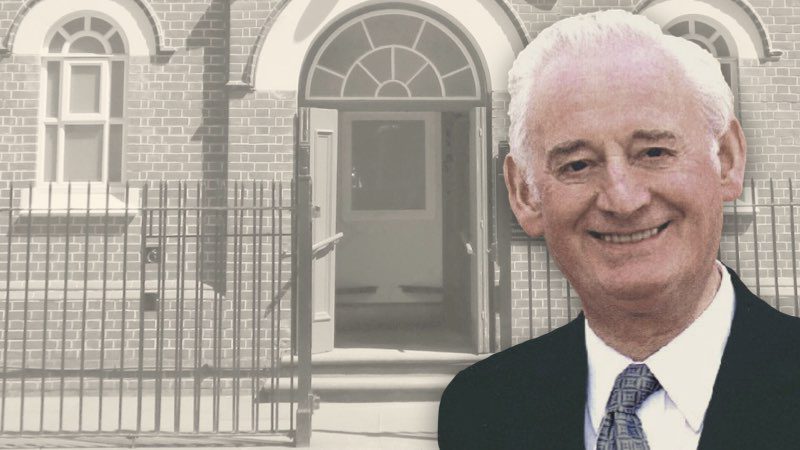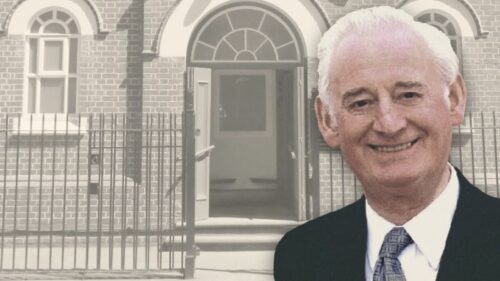
What Confidence Is This Wherein Thou Trustest
[Posted by permission. Bethel Strict Baptist Chapel.]
[Sermon preached at Bethel Chapel, Luton, by Mr. B.A. Ramsbottom, on Lord’s day morning, 30th September, 2001. This was the first sermon preached by Mr. Ramsbottom after an absence from the pulpit of three weeks due to suspected heart problems]
“What confidence is this wherein thou trustest?”—2 Kings 18.19
There is no more important question in the whole Word of God than this, and it is your mercy and mine if we know the answer. This was a day of darkness, sorrow and blasphemy, Jerusalem surrounded by an invading army, death and destruction staring them in the face, and this question was hurled at godly King Hezekiah in a way of scorn, in a way of contempt: “What confidence is this wherein thou trustest?” Hezekiah knew the answer, and beloved friends, it is your mercy and mine if we do.
We think first of all of this vital question concerning the everlasting salvation of our souls. Now, what confidence is this wherein we trust? In other words, what hope have we that our sins are forgiven, that our religion is right, that we have peace with God, that we are “saved in the Lord with an everlasting salvation,” that we are among the Lord’s eternally-loved people? because either we are or we are not. Now, what confidence is this wherein we trust? One of our hymnwriters says this:
“Let no false comfort lift us up
To confidence that’s vain.”
There is that vain confidence, that false confidence. Some do not believe there is a God; that is their confidence. Some do not believe there is an eternity; that is their confidence. Some believe that everyone is saved, that all are children of God; that is their confidence. There are others who take it for granted that they are right.
But this comes very close to you and me personally, and may the Holy Ghost make it very close and very personal. Now, “What confidence is this wherein thou trustest?” What hope have we of salvation? What hope have we of heaven? I believe if our religion is real, we shall know something of having our false confidence shattered, and that is a very solemn, painful process, when the Holy Spirit in the new birth shatters every vain hope, our refuges of lives, our covenant with death and hell, and where is our confidence then? Where is our hope then? Where is our trust then? And then to see the only ground of confidence in the Person of the Lord Jesus, that solid ground of confidence.
When this question was spoken, hurled at godly King Hezekiah, “What confidence is this wherein thou trustest?” he knew the answer, but it was not a vain confidence. It was not a false confidence. It was built on a solid foundation. It rested on solid ground, and though everything was against it, it stood every storm and it triumphed. But, “What confidence is this wherein thou trustest?” It is to be found trusting in the Person of a once-crucified but now risen, exalted Saviour. That is a confidence that can never be put to shame. It is resting on His perfect righteousness, because we have none of our own.
“My best is stained and dyed with sin,
My all is nothing worth.”
And it is that resting on the Redeemer’s most precious blood. Now if this is your confidence and mine, it is a confidence that will never, never be put to shame, now or to all eternity.
“What confidence is this wherein thou trustest?” How many of you have that sweet hope in the Lord Jesus? How many of you have been brought to rest on His precious blood? How many of you have been brought to plead His righteousness alone? How many of you know the name of Jesus, the name which is above every name? And how many of you see that beauty and that resting place in His love, that “having loved His own which were in the world, He loved them unto the end”?
Now, “What confidence is this wherein thou trustest?” Really, there are these two sides to it. There are the great concerns of our never-dying souls and our salvation, and there is also the day of trouble, whether it is in the world, or whether it is in our families, our circumstances, whether it is spiritual, whether it is providential. O when these things come, to have a ground of confidence!
“What confidence is this wherein thou trustest.” Really, beloved friends, this word first rested on my spirit that terrible day over two weeks ago when there was the dreadful attack on the United States of America [the September 11 attacks on the twin towers of the World Trade Centre]. The circumstances of Hezekiah here and the things that were happening were something similar. Absolute destruction was staring them in the face. Here was this mighty king, this mighty army, surrounding the walls of Jerusalem. They were there with their swords and their spears and their arrows and their engines of war and their battering rams, and there was this poor, helpless people with King Hezekiah in Jerusalem, and it seemed that in the next few days they would be completely crushed in pieces, completely destroyed. It was just death and destruction staring them in the face. I could see a vital similarity between what had taken place in the United States of America and what there was here. O but what a wonderful thing if such things were to come upon London, upon Luton, upon our country, if we have a sure and certain confidence! If whatever there be, whatever there may not be, we can feelingly say,
“No fatal shipwreck shall I fear,
But all my treasures with me bear.”
Now how would you and I stand – sudden death, sudden destruction – if we had an attack just like America had an attack?
“What confidence is this wherein thou trustest?” And then we look at the world situation, men’s hearts failing them for fear. “What confidence is this wherein thou trustest?” Now the people of God have a Father, and that Father loves them; that Father cares for them; that Father is almighty; that Father is on the throne; that Father is in control. Nothing can ever take place apart from His divine permission, and nothing can ever take place, only what is for His honour and glory, and nothing can ever take place, but what is for His people’s good. Do you believe it? Is this the confidence wherein you trust?
“O let me know my Father reigns,
And trust His tender care.”
If in these dark, solemn, calamitous days in the world, we really believe what we do believe – providential and spiritual, these concerns in the nations, these concerns of our souls’ salvation – O to see that solid ground of confidence!
“What confidence is this wherein thou” – thou this evening, thou sitting in thy place – “What confidence is this wherein thou trustest” – concerning your soul, your salvation, concerning tomorrow, next week, concerning the things in the world? “What confidence is this wherein thou trustest?” I know what some of you are going to say to me, and it is this: I do not feel very confident; I am not a confident sort of person. And concerning my soul’s everlasting salvation, well, I cannot say that I am truly confident, and as I think of evil things in the world and in the church of God, and in the family, and in circumstances, well, I cannot really answer this question and say that I feel confident.
I want to make this point abundantly clear: the difference between feeling confident and having a solid ground of confidence. Let me try to illustrate. On that very solemn Passover night, the destroying angel was passing through the land, bringing death and destruction. Now all Israel were sheltering beneath the blood. I do not want to be imaginative, but I should think that night one or two of them felt confident, but really, knowing my own heart and knowing what the human heart is, I should think most of them were not feeling all that confident as the midnight hour drew nigh and that destroying angel was coming over, and they knew it was death and destruction. But the point was not whether they were feeling confident; it was the ground of their confidence – the blood of the lamb, the blood sprinkled. It is a vital point and it touches the whole nature of saving faith, justifying faith. Of course, those who felt confident were more happy, but they were not more safe, not more secure.
Now, “What confidence is this wherein thou trustest?” It is the ground of confidence. It is not whether you feel confident or not. It is nice to feel confident. God’s people at times do feel confident. They are more happy when they feel confident. But it is the ground of confidence, the ground of hope, the ground of trust. In other words, it is this: where is it that you and I confide? Where do we confide? That is the great point
“They that in the Lord confide,
And shelter in His wounded side.”
Now then, what confidence is it? Not feeling confident; the ground of your confidence, the One on whom your hope is built, the place you trust, the One in whom you confide.
“What confidence is this wherein thou trustest?” With Hezekiah it was not a vain confidence; it was not a false confidence. Neither is it with the people of God when they are brought by faith to trust in the Lord. Really it is that same point in the little story I have told you over and again over the years, of the poor, drowning seaman, and there was that rock, and he managed to reach it, and he lay there all night. Well, he did not feel very confident, but the ground of his confidence was that rock, and though he shook, and though he trembled all night long, the rock did not shake; the rock did not tremble. O that is a good religion that will take a sinner to heaven – trembling on the Rock, and if you shake, the Rock does not, and if you shake on the Rock, you can never be shaken off it.
“On the Rock of Ages founded,
What can shake thy sure repose?”
Now this is the confidence wherein we trust.
I would just like to say one or two things about the way in which Hezekiah did trust in the Lord, the way he did confide in the Lord. “What confidence is this wherein thou trustest?” One thing: he rested on the Word of God. He rested on what God had said, God had spoken. He rested on the promise. That confidence was not put to shame. He had everything against him, but he had that word to rest on.
“Thy word that I have rested on,
Shall help my heaviest hours.”
His confidence was not put to shame.
Another thing was this. We are told that neither Hezekiah nor any of the Israelites sought to answer the blasphemies of Sennacherib and Rabshakeh. They “answered him not a word.” In other words, they did not say anything at all to their enemies, but they said a lot to God. Sometimes it is like that with you. You may be in things tomorrow and next week. “What confidence is this wherein thou trustest?” What are you looking at? What are you relying on? It may be people are saying things against you, or saying things to bewilder you. O if you can be silent to them, but not silent to God! Hezekiah did not answer one word to Sennacherib, but God did. It was a terrible answer: one hundred and seventy five thousand corpses around the walls of Jerusalem the next morning. It is not often we are there – when in trouble, a problem, perplexity, we are quiet, silent. “In quietness and in confidence shall be your strength.” Leave it with God and leave Him to answer.
Then there is another thing with Hezekiah. He received that letter. It was a terrible letter, a threatening letter, a frightening letter, and he took it up to the temple and laid it open before God. That confidence was not put to shame. How often in our lives we receive a letter, and before we answer it, we have to spread it before the Lord, Hezekiah-like. You may have a letter waiting to be answered tomorrow morning. Do not answer it until you have spread it before the Lord. Let that be the confidence wherein you trust. Or it may be the other way round. There might be a letter you have to write. Well, do not write it before you have spread it before the Lord, and do not put it in the envelope before you have spread it before the Lord, and do not put it in the letter box before you have spread it before the Lord, and that confidence will not be put to shame.
But especially Hezekiah confided in the Lord by prayer, and we read this morning his prayer. It was short; it was real; it was earnest; it was a beautiful prayer. Really, in all his helplessness he put all his concerns into the hands of his God, and he put his confidence there. “Nor did he suffer shame.”
Well, this great, this vital question: “What confidence is this wherein thou trustest?” – with Hezekiah, with you and me, the great concerns of the nations, our own personal concerns. “What confidence is this wherein thou trustest” concerning your soul’s salvation? “What confidence is this wherein thou trustest” in the day of trouble? “What confidence is this wherein thou trustest” in the hour of death? For,
“The storm of death rolls on apace,
And who can say how nigh?”
It is a terrible thing to die, and one day all of us must. O but what confidence?
Perhaps I may just speak a word personally on this point. Before I had my angiogram last Wednesday, according to present-day practice, all the risks have to be spelt out and what chance there is that whilst you are undergoing that angiogram, you might die. All these things have to be put to you, and there is quite a high risk. Well, it stared me in the face. What if I did not come through? What if I did die under it? Nearly fifty years’ church membership were dung and dross; forty-five years’ preaching – that was wood, hay and stubble. It is a solemn thing to be brought face to face with death. And this question: “What confidence is this wherein thou trustest?” I felt if ever I stood in this pulpit again, I would plead with each of you in all love and affection that you might consider how you stand when that day comes, whether it is a long time or whether it is soon. It is a wonderful mercy if you and I are found right at last; a terrible thing to be deceived; a terrible thing to be wrong.
The awfulness of it to me seemed to be twofold. One, the finality of it, and the other, the eternity of it. O but to come to our end, but may we be able to answer that question before then. May the Lord answer it for us, and may it not be a presumptuous answer. O to be blessed with the Spirit’s work, “saved in the Lord with an everlasting salvation,” complete in Jesus, nothing in self, everything in Him.
“What confidence is this wherein thou trustest” concerning your soul’s salvation and concerning all these troubles, but especially concerning your end? “What confidence is this wherein thou trustest?”
“But they that in the Lord confide, And shelter in His wounded side, Shall see the danger overpast, Stand every storm, and live at last.”
With joy we meditate the grace
Of our High Priest above;
His heart is made of tenderness;
His bowels melt with love.
Touched with a sympathy within,
He knows our feeble frame;
He knows what sore temptations mean,
For He has felt the same.
But spotless, innocent, and pure,
The great Redeemer stood,
While Satan’s fiery darts He bore,
And did resist to blood.
He, in the days of feeble flesh,
Poured out His cries and tears;
And, in His measure, feels afresh
What every member bears.
He’ll never quench the smoking flax,
But raise it to a flame;
The bruisèd reed He never breaks,
Nor scorns the meanest name.
Then let our humble faith address
His mercy and His power;
We shall obtain delivering grace,
In the distressing hour.
I. Watts
Benjamin Ramsbottom (1929-2023) was a Strict and Particular Baptist preacher. In 1967, he was appointed pastor of the church meeting at Bethel Strict Baptist Church, Luton, Bedfordshire, a position he held for fifty-five years.




